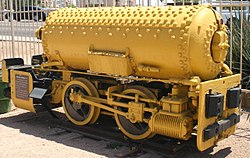Pneumatics
Pneumatics is the use of compressed air for mechanical motion. It has many uses.[1]
Pneumatic transfer systems are employed in many industries to move powders and devices. Pneumatic devices are also used where electric motors cannot be used for safety reasons, such as deep in a mine where explosive dust or gases may be present.
Examples of pneumatic tools
- Pneumatic drill (jackhammer) used by road workers
- Pneumatic nailgun
- Pneumatic switches
- Pneumatic actuators
- Air compressors
- Vacuum pumps
- Barostat systems used in Neurogastroenterology and for researching
electricity
- Cable Jetting - a way to install cables in ducts
- Pneumatic mail systems
- Air brakes on buses, trains, and trucks
Comparison to Hydraulics
Both pneumatics and hydraulics are applications of fluid power. Pneumatics uses air, which is compressible, while hydraulics uses relatively incompressible liquid media such as oil or water.
Advantages of pneumatics
- The working fluid is very light in weight so supply hoses are not heavy.
- Because the working fluid is (mostly) just air, there is usually no need for a return line for the working fluid and leaks of the working fluid tend not to be messy.
- Because air is compressible, the equipment is less likely to be damaged by shock. The air in pneumatics absorbs excessive force, whereas the fluid of hydraulics directly transfers force.
Advantages of hydraulics
- Higher energy density owing to the much higher working pressures usually employed.
Pneumatics Media
Pneumatic (compressed-air) fireless locomotives like this were often used to haul trains in mines, where steam engines posed a risk of explosion. This one is preserved H.K. Porter, Inc. No. 3290 of 1923.
References
- ↑ In dentistry applications, pneumatic drills are lighter, faster, and simpler than an electric drill of the same power rating (because the compressor, is separate from the drill and pumped air is capable of rotating the drill bit at extremely high rpm).
Other websites
- www.pneumatics.be - didactic website - for students - how pneumatics works
- U.S. Department of Energy Archived 2006-06-25 at the Wayback Machine - Improving Compressed Air System Performance
- Fluid Power Educational Foundation Archived 2020-07-08 at the Wayback Machine - Advancing and Supporting Hydraulic & Pneumatic Education
- Pneumatics Glossary Archived 2013-03-15 at the Wayback Machine - Glossary of Pneumatic Terms


